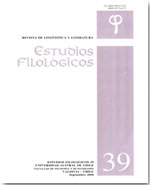The access to the TV news as a political strategy: a discourse analysis
Main Article Content
Abstract
This analysis shows how socially powerful agents have access to the discourse generated by communications media in order to employ political-communicational strategies. In cases like this, a general audience becomes a secondary receiver; instead, the intentional receivers, those to whom the voices having access to the news address, are comprised by a far more reduced and an ideologically more homogeneous group of receivers. The role of journalists is, in this sense, quite passive; they are utilized by political agents within a strategic framework but are unaware of this. All of the above is revealed by means of a linguistic-textual-oriented discourse analysis which is applied to Chilean TV news and which helps keep track of hidden voices addressed to those public texts, implanting topics, and exercising power over discourse.

